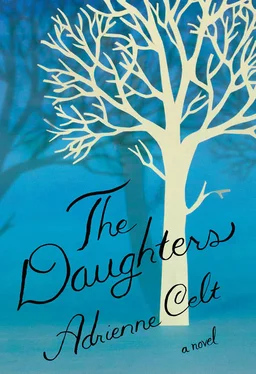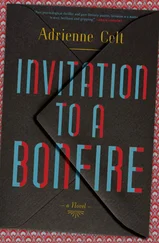Greta vibrated with music, so much that it was hard for her to believe that neither her husband nor her sons noticed it. Sometimes Konrad paused in his games when she walked by as though he had been struck by an idea. But he never sang a note, never hummed along with her; for all his affinity with animals, he never caught a small bird and brought it to his mother trapped in his hands, singing. To even want this, Greta knew, was selfish. He was his own child. He had his own path to follow.
The cottage that the family shared was built of redolent pine, the walls always dripping slowly with sap. It seemed to be a sturdy and impenetrable structure, but when Greta was alone and looked around herself she always felt the forest encroaching, the trees returning to reclaim their material selves. Greenling stalks coiled around into the backs of chairs, and trunks like spines erupted from the floorboards: a thicket of men turning their attention to the distance. From the ceiling sagged branches so robust that Greta knew they came from trees almost too large to fathom, and despite the careful chinking Saul had done, wind seemed to slither through the timber limbs.
When they grew out of their cribs, each boy went with his father into the woods on what Saul called a hunting expedition, the purpose of which was to find the boy’s bed. They would spend a full day, sometimes two, searching through gnarled branches, assessing the benefits of each possible contender. Andrzej chose a mighty pine because the tree had impressed him in the backbone of his house, and because upon leaning his ear to its trunk he heard something inside that he chose not to describe. Fil settled on ash after telling his father to close his eyes and then sneaking a taste on the tip of his tongue.
And Konrad, who was often inscrutable, spent two days of fruitless hunting. When his father was nearing exhaustion and despair, a sudden wind picked up and began blowing leaves around the forest floor. Konrad held out his hand and snatched something off the breeze. By the river’s edge, he and Saul found the willow that the leaf belonged to, and Konrad hid his eyes behind the roughing knuckle of one hand until the tree had been felled.
During these expeditions Greta stayed near the house or barn, usually wrestling with a new presence in her belly. What tree will you choose? she hummed and asked the air. When Andrzej was on his quest, it was a cheerful question; with Fil, uncertain. And by the time Konrad stepped into the woods, Greta’s mind sat balanced on a careful scale of fear and joy as she contemplated the red mess of a child coagulating within her. For between each boy there had come a girl, at least one, for whom there had also been a careful selection of wood grain. But instead of a bed, Saul cut the somber boards of a box, inside which each girl would nestle like a jewel while she rested silent beneath the trees.
It wasn’t until I was eleven that I realized what these sleeping girls meant. Who they were. They’d shown up in various Greta tales over the course of my life as anything from vital talismans to mere window dressing, their grave markers landmarks on the grassy ground my great-grandmother walked. But from the way that Ada spoke about them, it hadn’t occurred to me that they were my flesh and blood — Ada’s sisters.
Once the thought came to me, it took up residence. For weeks the dead girls hovered around my head like summer flies; I had to blink them out of my eyes and bat them away from my hair. Anytime I managed to distract myself — slipping bread into the toaster for a sandwich or leafing through the libretto Ada had given me for my birthday — one would pluck at my sleeve until a thread came loose. And as soon as I acknowledged one, the lot would be upon me, whispering their insubstantial opinions in my ear.
The haunting took its toll. I began to toss and turn in my sleep, and the food on my plate lost its savor. Whatever the meal was — pierogi, pizza — it appeared sallow to me, lacking in essential nutrients. My cheeks hollowed out. I looked like a ghost myself.
One day Ada was sitting across from me in the living room of our apartment, correcting my posture as I warmed up with a series of minor scales. She held a yardstick like a conductor’s baton, waving it back and forth to keep time. Occasionally she would press it to my shoulders or stomach to make sure I held an erect carriage. This was how I spent my time after school, on weekends. Other girls came over sometimes, but few returned. They made vague noises about being too busy, and most of the time I didn’t mind — we didn’t have much to say to each other. But it would have been nice to have someone to whisper to about the ghosts.
Baba Ada’s approach to my training was unscientific — she encouraged a straight spine that looked disciplined but is not technically correct for singing. At an age when most of my peers were still inventing games with plastic horses and sneaking makeup from their mothers’ purses, I was singing Puccini. But the maturity of my voice outstripped my emotions by several years. Inside I was still young enough to want to believe that my babenka always knew best.
Today, though, the short wooden flicks began to irritate me. It was already taking all my attention to focus on the transition from an ascending melodic minor to a descending when my mind kept drifting to the graveyard behind Greta’s house. Each tap of the ruler against my abdomen felt like a gentle reminder: you’re breathing , it said, that must be nice . We started every rehearsal session with at least fifteen minutes of scales, and today there seemed to be no end to them.
Ada switched the ruler to her other hand, and in doing so cracked a nail.
“ Matko Boża ,” she said under her breath. And she set the yardstick on the sofa while she went to find clippers and a file. In the meantime, I was meant to take a short rest; this was the agreement made through countless sessions of voice lessons — while the cat’s away, the mouse must save her breath. I walked over to the couch and picked up Ada’s ruler, flexing it between my hands. Not very strong. With one swift bend, I snapped it.
Baba Ada rushed back into the room.
“What do you think you’re doing, lalka? Do you think rulers don’t cost money?”
I was ready to start yelling at her. To tell her that her rules were crazy and that my posture was fine and that I was tired. But instead my lower lip began to tremble.
“What happened to Greta’s daughters?” My voice came out in a whisper. “Her other daughters?”
“Oh.” Ada looked surprised, turning the nail clipper over and over in her hand like there was some important part of it she was missing. “You’re worried about that?”
I nodded. Ada walked over to the window and looked out of it, and for a little while I thought she wasn’t going to answer me at all. My anger started to heat back up, but before it could boil over, she spoke.
“Konrad used to pick flowers for them.”
“What?”
“Well, they all did. Konrad and the others picked flowers, and Greta buried the girls in their own little yard and kept them safe.” She turned towards me and looked thoughtful. “Except one. But you know that. It’s part of the story.”
It was true. The girls’ graves, the boys’ gallantry — all that was part of the story. I troubled each piece smooth over time, from Greta’s appearance in the factory door to her fight for the sacred ground of Poland when the war came. Ada told me her mother was a warrior, and that when she was tired she went and lay down with the girls underneath their house, ready to wake up again when the time was right. Safe and protected.
All this should have comforted me. It had, in fact, many times before. But today something nagged at me. The ghosts, who wouldn’t let me go.
Читать дальше












